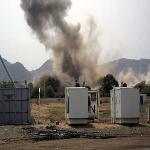June 16, 2011

Photo: AP
A huge explosion is seen near a United Nations compound in South Kordofan state, June 14, 2011
As violence continues along Sudan's disputed north-south border, the government of Sudan has rejected U.S. President Barack Obama's demand for peace.
On the defensive after international condemnation of an aerial bombing campaign in Sudan's Southern Kordofan State, the government in Khartoum is claiming the attacks were prompted by aggression on the part of south Sudan's military forces.
The clashes between the northern Sudanese Armed Forces and elements of the south's Sudan People's Liberation Army broke out two weeks ago, after attempts by the northern forces to disarm fighters in the area. According to the United Nations, some 60,000 have fled Southern Kordofan, seeking refuge from the violence.
Late Tuesday, U.S. President Barack Obama urged extreme caution on both sides, in an attempt to push Sudan back from the brink of war.
"There is no military solution," said Obama. "The leaders of Sudan and South Sudan must live up to their responsibilities. The government of Sudan must prevent a further escalation of this crisis by ceasing its military actions immediately including aerial bombardments, forced displacements and campaigns of intimidation."
The bombings come just three weeks before south Sudan declares independence and Sudan officially splits into two nations. The separation will mark the culmination of the 2005 Comprehensive Peace Agreement (CPA), which ended two decades of civil war between the government and southern rebels.
Obama warned the leaders of both governments they faced international isolation should the violence continue. He further pressed the government of north Sudan, reminding leaders of the U.S. promise to normalize relations with Khartoum in return for their adherence to the CPA.
But the government in Khartoum has rejected implications that it initiated the violence. On Thursday, the Sudan Tribune reported that Sudan's Ministry of Foreign Affairs has claimed the bombardments were in retaliation to escalation on the part of South Sudan and attacks on local police.
In a statement issued through the Sudanese News Agency, the ministry spokesman al-Ubayid Muroah, accused the United States of using intimidation tactics against the government in Khartoum.
As the official secession of South Sudan approaches, peace appears to be deteriorating throughout the region, prompting fears of escalation and a return to civil war. In the disputed region of Abyei, southern army spokesman Philip Aguer reported that five northern soldiers were killed in clashes along the River Kiir on Wednesday.
Under the CPA, Abyei was supposed to hold a referendum to determine whether it remained with the north or joined an independent south. However the issue of Abyei, along with other critical issues such as border demarcation and oil revenue-sharing remain unresolved.